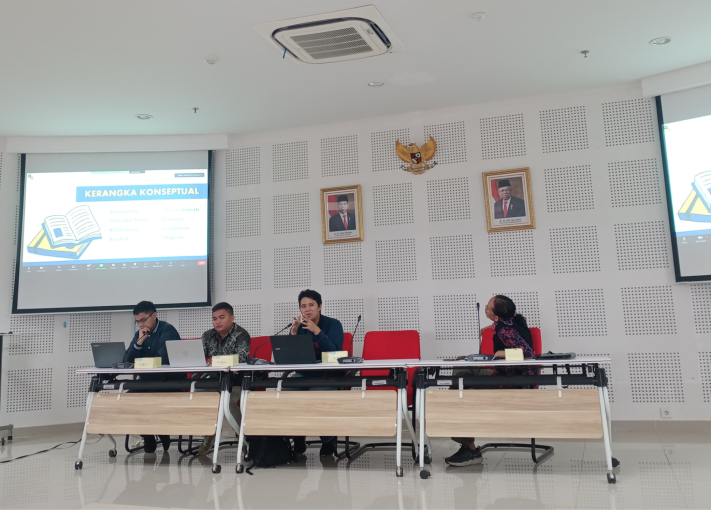
On Friday, March 1, 2024, the Department of History, Faculty of Cultural Sciences UGM held another colloquium for history masters. There were two presenters and two discussants in the colloquium, namely Fajar Santosa and Adi Wildan Alamsyah as presenters, and Dr. Ahmad Athoillah and Dr. Ravando Lie as discussants. The event took place in a hybrid manner (online and offline) from 09.00 to 12.00 WIB in Room 709 Soegondo Building, Faculty of Arts UGM.
Fajar Santosa was the first presenter in the colloquium. He presented his thesis plan entitled “When the People Rebelled: Mass Movements in the 1998 Reformation in Surabaya” which discussed mass movements in the second metropolitan city, Surabaya, during the outbreak of reform events centered in Jakarta. He explained that the demand for reform was caused by the economic crisis that occurred at that time. The crisis caused the price of goods to rise, layoffs occurred in various places, and riots occurred everywhere. The small and middle class people panicked. They formed a social movement demanding reform and the resignation of President Soeharto from office.
Fajar Santosa said that the narrative that has developed so far only describes the reform movement in 1998 as a student movement as a representation of the middle class. Meanwhile, the narrative that explains that reform was driven by all classes, including the small, middle and elite, has not been widely discussed, including in the context of Surabaya. In his thesis plan, Fajar Santosa uses Eric Hoffer’s Mass Movement theory as a conceptual basis.
Next, the thesis plan entitled “The Chinese Community in Jember 1947-1971: Displacement and the Process of Social Integration with Local Communities” was presented by Adi Wildan Alamsyah as the second presenter. He explained that during the Bersiap period (1945-1947), the Chinese community became one of the excluded groups. Around 4000 Chinese refugees from West Java chose Jember as their destination to seek refuge. In the new region, they continued their lives and integrated with the Jemberan community. The soccer game and the existence of the square became a medium of integration between the Chinese refugees and the Jemberan community.
Adi Wildan Alamsyah said that one of the reasons why Jember was chosen as a destination for Chinese refugees was probably because Jember was a member of the Chinese chamber of commerce. Other members of the Chinese chamber of commerce include Cirebon, Bandung, and Batavia as its center. He also said that Jember as a city can be said to be a diaspora city. This is because many people from various tribes and ethnicities have come and settled in Jember, such as Javanese-Madurese, Osing, Mandarese, and Chinese.

